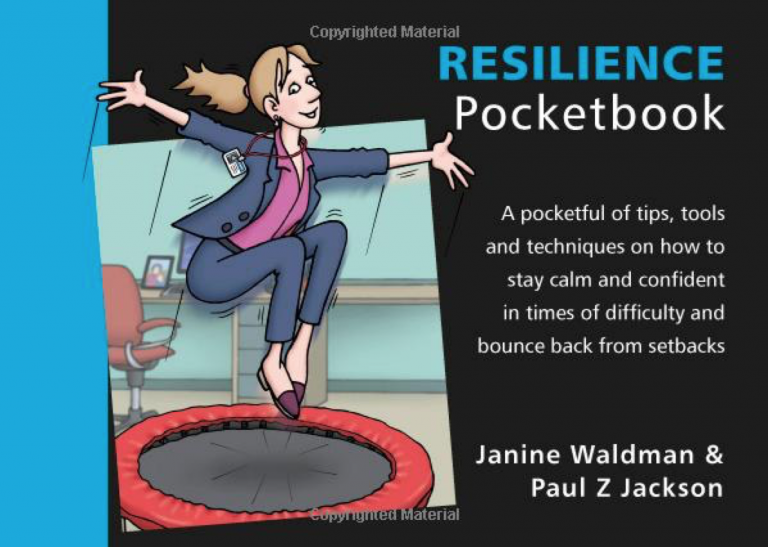Book Review - Resilience Pocketbook
Feb 1, 2022
John Brooker, Janine Waldman and Paul Z Jackson

Resilience Pocketbook by Janine Waldman and Paul Z Jackson
Management Pocketbooks.ISBN: 978-1 906610920 – 112 Pages
Formerly an associate lecturer for the Open University in the UK, I received a late assignment from a student with a letter of apology for the delay. She explained that she had returned home to Spain for a course of chemotherapy treatment, was very sorry that she had missed the deadline and could I still mark it? Though a long while ago, I recall how much I admired her ability to deliver that piece of work. She had a full-time job in the UK, worked in her “spare” time on her MBA, dealt with the emotion of her illness, uprooted herself from the UK back to Spain, had therapy and still submitted an excellent assignment.
I was reminded of her when I read the Resilience Pocketbook. In the book, the authors describe resilience as, “the ability to face the constant change and struggles of the day and still come out working well… your readiness to meet the world in a resourceful state.” I think this describes admirably, how the student coped; she was a role model for resilience.
As many of you will know, Janine Waldman and Paul Z. Jackson, you can find them at ( http://www.thesolutionsfocus.co.uk/), have many years’ experience of using Solution Focus (SF). With such authors, it is no surprise that most of the material in this book is underpinned by the Solution Focus approach and tools.

Content
As one reviewer states on Amazon, “the book is full of useful tips, activities and encouragement” and I agree. It is laid out as follows:
1 - An introduction to resilience – its importance, do’s and don’ts, etc. 2 - Resilience at work – the business case, etc. 3 - You and your resilience – measuring your resilience, etc. 4 - Four dimensions of resilience – a handy way to chunk your thinking 5 - A resilience toolkit – tools to help you be more resilient and how to use them 6 - Mistakes and progress, failure and recovery – thoughts on perfectionism, language and the flow concept 7 - Teams: Spreading resilience – helping teams to be more resilient.
So, while the book is pocket sized, it still provides a whole suit of topics to consider within the subject of resilience.
What works?
The vast majority of the book. It is well written in short chunks of information, laid out logically, and has simple to follow instructions where needed. This is important when business books are often not read past the first chapter, (Source: conversation with Mindy Gibbins-Klein, Panoma Press). Four aspects I believe the target audience will find particularly helpful are:
The exercises
It has some excellent exercises, e.g.
- Resilient recall – have people recall a time when they were resilient, list the skills, qualities and resources they called upon then and note how these might be used again when resilience is needed
- Focus on what you can influence – encourage people to focus on what they can influence and whether it is worth taking the time to influence it.
The four Dimensions of Resilience
These provide a handy reminder of areas you can focus on when you seek to be more resilient; Physical, Mental, Emotional and Social. I liked the concept of physical energy guzzlers and sources, could helpfully use “the letter from the future” myself and was reminded of the importance of emotional resources.
The Resilience Toolkit
A set of tools based on Solution Focus, which, while common place to SF practitioners, will provide new insights for others.
Tips to Increase Team Resilience
For example:
- Demonstrate and encourage the sharing of success stories, especially in meetings, so that people begin to focus on success before meetings – and display these successes too
- Have people shift their focus from the problem to what they want to happen, so that conversations become more constructive
The book is an exemplar of how we can use SF to motivate and encourage individuals and teams and is at its strongest when it does.
Reflection
I reflected on three questions while reading the book:
Could we use SF based questions for a resiliency quiz?
“The Resiliency Quiz”, is adapted from work done by another author. This is 20 statements to respond to (“Strongly disagree” to “Strongly agree”), to provide a baseline for how resilient you are right now. Score over 80 and you are “outstandingly resilient”, score 40 – 50 and you are “struggling”. I wondered, if a person is struggling to cope, does this help them to be more resilient? Is there space for a quiz using SF based questions?
Does “support” create flow in the Flow Model?
The Flow Model (Csikszentmihalyi) is based on the Challenge of the task in hand and the Skills available to complete that task (“Skills” is sometimes supplemented by “capabilities”).
It represents a person performing an activity who is fully immersed in a feeling of energized focus, full involvement, and enjoyment in the process of the activity.
In the Resilience book, the y axis is stated as “Challenge”, however the x axis is stated as “Support”, not “Skills”. Substituting “support” for “skill” is an interesting tactic in this context, and could be said to make the model more solution focused, however, does having the right level of support actually create flow? A point to discuss in the bar at the next SF conference.
Application or Outcome?
A final thought that struck me, was whether SF resilience is an application or an outcome. Alan Kay, another experienced user of SF, uses the concept of SF Applications to describe how he uses SF (see Alan’s video in this edition of InterAction), for example, for strategic planning, project management, change management, coaching, etc.
One could consider “Increase resilience”, as another application of SF as this book implies. However, in my experience, whenever practitioners use SF we increase the resilience of individuals and teams. So, is it an application or outcome? Or both? Pragmatically, if an organisation seeks to increase the resilience of their people then you might position SF Resilience as an application. If not, you can position resilience as a benefit of using SF.
In summary
This is an excellent book that has packed a lot of useful activities, tips, advice and thought provokers into a small format. The target audience will gain much to help them increase personal and team resilience, while the SF practitioner will find useful ways to apply SF to the topic and be prompted to do some thinking about how SF increases resilience.
Resilience Pocketbook is available on Amazon
Another SF based book on resilience you might want to read is Resilient People, Resilient Teams, by Liselotte Baeijaert and Anton Stellamans. ISBN 978-1-4709-9996-4. To obtain this, you can e-mail the authors at: info@ilfaro.be